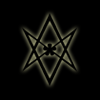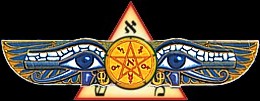TAROT - The Meaning of the Cards
Prince of Swords

The Prince of Swords indicates an atmosphere of frost, hardness, deceit, strife and controversy that can spoil pleasant areas of life so far. Although cooling can result in clear vision and common sense, usually the negative side of the air element of the card is detected. This can mean a cool distance, debates on the tip of the knife, pity, corrosion, and bitter irony. That is why the Prince (Knight) of Swords is often a precursor of divorce, strife, sharp hassles and thoughtful humility. |

| Crowley Thoth Tarot: Court Cards - Dignitaries - The Prince of Swords |
|
PRINCE OF SWORDS |
The Princes represent the Forces of the letter Vau in the Name. The Prince is the Son of the Queen (the old King’s daughter) by the Knight who has won her; he is therefore represented as in a chariot, going forth to carry out the combined Energy of his parents. He is the active issue of their union, and its manifestation. He is the intellectual image of their union. His action is consequently more enduring than that of his forbears. In one respect, indeed, he ac quires a relative permanence, because he is the published record of what has been done in secret. Also, he is the “Dying God”, redeeming his Bride in the hour, and by the virtue, of his murder.
This card [Prince of Swords] represents the airy part of Air. With its particular interpretation, it is intellectual, it is a picture of the Mind as such. He rules from the 21st degree of Capricornus to the 20th degree of Aquarius.
The figure of this Prince is clothed with closely woven armour adorned with definite device, and the chariot which bears him suggests (even more closely) geometrical ideas. This chariot is drawn by winged children, looking and leaping irresponsibly in any direction that takes their fancy; they are not reined, but perfectly Capricious.
The chariot consequently is easy enough to move, but quite unable to progress in any definite direction except by accident. This is a perfect picture of the Mind.
On the head of this Prince is, nevertheless, a child’s head radiant, for there is a secret crown in the nature of this card; if concentrated, it is exactly Tiphareth.
The operation of his logical mental processes have reduced the Air, which is his element, to many diverse geometrical patterns, but in these there is no real plan; they are demonstrations of the powers of the Mind without definite purpose. In his right hand is a lifted sword wherewith to create, but in his left hand a sickle, so that what he creates he instantly destroys.
A person thus symbolized is purely intellectual. He is full of ideas and designs which tumble over each other. He is a mass of fine ideals unrelated to practical effort. He has all the apparatus of Thought in the highest degree, intensely clever, admirably rational, but unstable of purpose, and in reality indifferent even to his own ideas, as knowing that any one of them is just as good as any other. He reduces everything to unreality by removing its substance and transmuting it to an ideal world of ratiocination which is purely formal and out of relation to any facts, even those upon which it is based.
In the Yi King, the airy part of Air is represented by the 57th hexagram, Sun. This is one of the most difficult figures in the book, on account of its ambivalence: it means both flexibility and penetration.
Immensely powerful because of its complete freedom from settled principles, capable of maintaining and putting forward any conceivable argument, insusceptible of regret or remorse, glib to “quote Scripture” aptly and cunningly to support any thesis soever, indifferent to the fate of a contrary argument advanced two minutes earlier, impossible to defeat because any position is as good as any other, ready to enter into combination with the nearest element available, these elusive and elastic people are of value only when firmly mastered by creative will fortified by an intelligence superior to their own. In practice, this is rarely possible: there is no purchase to be had upon them, not even by pandering to their appetites. These may nevertheless be stormy, even uncontrollable. Faddists, devotees of drink, drugs, humanitarianism, music or religion, are often in this class; but when this is the case, there is still no stability. They wander from one cult or one vice to another, always brilliantly supporting with the fanaticism of a fixed conviction what is actually no more than the whim of the moment.
It is easy to be deceived by such people; for the manifestation itself has enormous potency: it is as if an imbecile offered one the dialogues of Plato. They may in this way acquire a great reputation both for depth and breadth of mind. |
| |
[Source: The Book of Thoth] |

| Raven's Tarot - The Prince of Swords (Prince of the Chariot of the Winds) |
|
THE PRINCE OF SWORDS |
 |
Astrology: 21° Capricorn to 20° Aquarius
Element and world: The Air in the Airs of Yetzirah
Tree of Life: Tiphareth
|
Being Air in Air, the Prince of Swords is the pure manifestation of mind and intellect, full of plans and ideas which on the worst side may disturb and confuse each other, on the best create an inexhaustibale spring of creative thoughts.
The Prince of Swords is intelligent, idealistic, full of creativity and fluidity, a real Mercurian spirit who often will argue just for the fondness of arguing - and not so much for the arguments themselfes. The Prince of Swords can throw himself head over heels into a scientific research, reaching highest levels within a short time and then throw everything away without further notice because something else appears more interesting at the moment.
On the dark side, the Prince of Swords lacks both the qualities of Water and Earth, he can easily become unstable, unreliable and extremely moody, using his amount of intelligence to trick himself through life, becoming a master of disguise and cheat.
Drive: Idealism, intellectuall agility
Light: Creativity, richdom of ideas, intelligence, mastery of words
Shadow: Harsh, malicious, unreliable, cheating, crude
|
| |
[Source: Raven's Tarot Site] |

|
THE KNIGHT OF SWORDS - (Prince of Swords) - Saturn - Venus - Harshness
Keywords: airborne aspect of the air, creative thinking, cutting through all complex, backward issues, getting rid of limited thoughts and models, clear perception
Advice: Free your mind and soul from all barriers. But be sure that you express your thoughts and plans so that others can understand them. Accept their opinions humbly. Your thoughts may be ahead of your age, but you can adjust them to the situation so that your vision works in the present without sacrificing anything.
Question: What beliefs, feelings, relationships, or programmed thoughts do you allow you to limit?
Suggestion: Make a list of the factors that limit your life, either internally or externally, and choose the ones you want to get rid of now.
Revelation: The limits of my creative potential are only those in which I believe in myself.
Analogies:
Ji-Ching: None (?)
Mythology: The Boreas
Keywords: coldness and hardness
A sword does not turn a baker into a warrior. |

| The Knight of Swords |
|
KNIGHT OF SWORDS |
General Meaning
This card is traditionally entitled The Knight, but in some modern decks appears as The Prince. Traditionally, this card portrays the restless mind, aroused by thoughts of offense and defense, storming around searching for a target to pounce on. He often feels slighted, has a chip on his shoulder and bristles with a hostile attitude. His usual method is to look for someone to blame for his irritation.
Furthermore, in an attitude of righteousness, he may assign himself the job of correcting the offender. Jumping easily to conclusions, he shoots first, asks questions later and is therefore often guilty of overkill. This is not to say that he does not have his heroic side; a single-minded combativeness can have its value. However, even when he is doing the right thing, he is likely to be doing it for the wrong reasons. Apt advice for this card is to deeply question your motives for what you are thinking about doing. Forethought will assist you in discriminating between righteous and unrighteous causes. Control any traces of impulsive judgement!
Occasionally you will notice in the detail on the card, that the person can be a woman rather than the expected man. There is some evidence that the tradition of knighthood included a certain number of "anonymous knights" who took mythic names and veiled their true identities. Living on the road with few or no servants, they served as freelance defenders of travelers, champions of the little people against the exploitation of both highway robbers and the wealthy classes. Odds are that some of these knights-errant were camouflaged women, and that idea is preserved with the traditional representation of the Sword Knight.
In the Reversed Position
When the Knight of Swords is reversed, fear of conflict is so powerful that you will bargain away all that is meaningful just to get through, or out of, a tough situation. You will say what you don't mean, promise what you can't deliver and hope to be saved by a miracle, just to see yourself delivered from a stressful time.
When you learn to tell the simple truth from moment to moment, you will have no more use for this reactionary behavior that is invariably followed by shame and regret.
In the Advice Positon
The Knight of Swords in this position advises you to remain open to conflicting ideas instead of surrounding yourself exclusively with people who agree with you. This Knight is most effective when testing his ideas in a debate. Emulate his ability to communicate successfully by keeping your conversations impersonal and humorous so no hurt feelings are provoked.
Practice your negotiation skills so you will be in shape for imminent diplomatic challenges as they arise. A sparring partner could help you learn to control impulsive comments and stem your urge to be right at the expense of others being wrong. |
| |
[Source: Tarot.com] |

Read more:
- » The Book of Thoth - A Short Essay on the Tarot of the Egyptians by Aleister Crowley.
- » Liber LXXVIII - On the Tarot - A complete treatise on the Tarot giving the correct designs of the cards with their attributions and symbolic meanings on all planes. - A description of the Cards of the Tarot, with their attributions, including a method of divination by their use.
- » Manuscript N - The Tarot - A Golden Dawn Manuscript - A Theoricus Adeptus Minor Paper.
|
|
|
|


Please support the Hermetic Magick Library!
(Kérlek támogasd a Hermetikus Könyvtárat!)
YOUR support keeps this site running. Thank you!
(A TE támogatásodra is szükség van!)


|